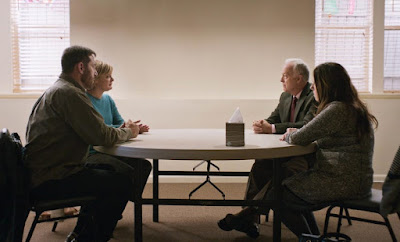What Do You Do with All These Feelings No One Cares about?
Mass is a deep , meditative, and somehow shimmery movie about a meeting that takes place inside a church basement. There are only a few glimpses outside this scene and environment: one of a piece of plastic tied to a barbed-wire fence that gets repeated throughout, the other of the street outside, cars, sidewalk, mountains and prairie surrounding the town. The purpose of the meeting is to unpack the horror and damage done by a school shooting, through a dialog between two sets of parents: the shooter's (Ann Dowd and Reed Birney), and one of the victim's (Martha Plimpton and Jason Isaacs).
It really is hard to convey the odd aesthetic reverence this movie uses, because it's almost holy. "Holy" without religion, without pretentiousness. It has everything to do with a cut-to-the-bone screenplay by Fran Kranz, who also directs. This is his first gig, and it is harrowingly on-target, without sentimentality but also basking in sentiment, not polemical but still representing both sides until both sides merge into a moment that will make you just outright sob. (Made me double-sob of course, but I'm a sucker.) The sobbing comes from the way the narrative relentlessly and quietly gives you what you need without you asking: mercy, forgiveness, a strange anonymous kindness that only exists in a reality you have to make happen through sheer force of will. And beyond that kind of cinematic and moral precision a true spiritual epiphany happens: an epiphany as unshowy and drab as that fold-away table the two sets of parents sit at for most of the movie.
I've always had a crush on Martha Plimpton. She was a great part of the late 80s, with her nimble teenaged-girl turns in Another Woman, Parenthood, and Running on Empty, but nothing prepares you for what she is able to accomplish in Mass. She is the movie's soul, and spends much of it quietly stewing, half-smiling, trying to not talk about what doesn't need to be talked about. As the mother of a boy who is killed in the shooting, she relays both helpless fury and furious disbelief that they even have to be in the same room with those people. Through her performance, though, Martha finds a way to dramatize the discovery that finding peace isn't really about emotions as much as much as honoring memory, trying to hold onto what they had and have in the face of such tragedy, such senselessness. Her character is pure working-class-smarts and all-in love, bruised and weary but no-nonsense about it, and when she tells a story about her son toward the end, a memory of him coming in covered in mud after playing football, you feel the story she's telling as an actual recollection you're having with her, not a scene in a movie. She takes you there effortlessly.
The same goes for Ann Dowd's downtrodden, fragile mother of the shooter: somehow through the way she turns her head, makes her eyelids slowly flutter, phrases spoken at different strange beats, you have a glimpse into hurt that goes beyond acting and artifice into empathy, which only makes the performance more devastatingly artful. There's a lot of great stagey business up-top in the movie, with Ann's mother bringing flowers to the meeting and offering them up so apologetically you don't want flowers to exist anymore. You want everyone to shut up about them, but also you see Ann's character cling to the bouquet like a life-jacket. Her silent expressions throughout seem to be whispering an ongoing mantra: what do you do with all these feelings no one cares about?
Both Martha and Ann are incredibly aided by Reed Birney and Jason Isaacs as fathers/husbands, who tend toward mansplaining at the start, trying to locate the polemic inside and outside of themselves. Gun-control, timelines, who's to blame for what and when and where. But both men melt in the ways they can as the movie steadily works toward what has to be done. Both actors yield the floor to the mothers as the movie reaches crescendo, which is only right, as both boys came from their wombs, their loves, their souls. I can't think of another movie off the top of my head that explores so deeply and dearly the connection between sons and moms, and when Ann gives us the final story about the shooter in the last minutes of the film you lose it all over again. The story is about her regret for not trying to do something about her son's moods and meanness, but it's also about the helplessness of knowing deep inside it really wasn't her fault, even though it would make everyone feel better, including her, if we could blame her.
"Bliss" is a weird overused term I keep returning to. I use it a lot when I write for some reason. I name blogs for it. And even though it might be trite, "bliss" is a concept I really do want to hold onto, especially in thinking and writing about Mass. The bliss this movie uncovers is the magic of not leaving a room even though every nerve in your body is calling for it. The bliss of going against everything inside you in order to find a way to forgive, to uncover grace in the moment that may help you live longer, may help you escape a prison you make by demonizing and running away. Mass finds beauty in the torment, finds release, even if fleeting, a path toward understanding someone you have every right to hate. There's really not another movie like it.




Comments
Post a Comment